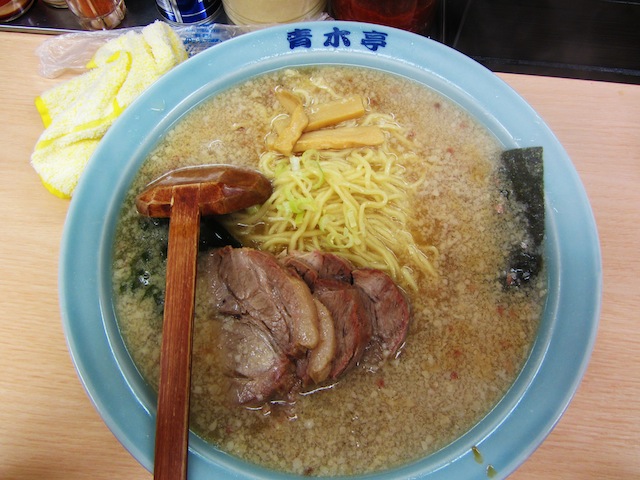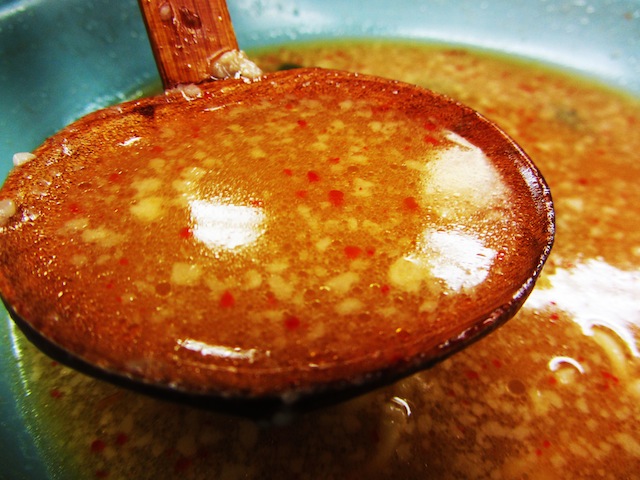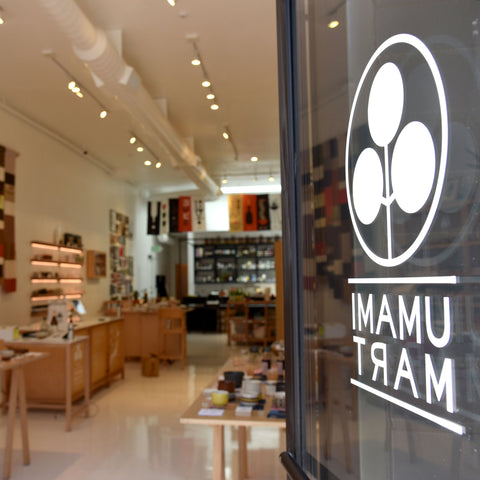
Push yourself. Every challenge makes you better. Or as I learned, making a fool of yourself at a run-of-the mill ramen shop prepares you for the big boys.
I recently traveled to Japan, where I had 21 bowls of ramen in 23 days. It would have been more but I was sidelined for a few days with a small stomach virus. Yes, I realize that 21 bowls of ramen and a stomach virus might not be coincidental. Although my money’s on the raw rabbit liver I ate in Fukuoka.
On my first full day in Tokyo I visited the ramen shop 30 feet from my hostel door, Aoki-tei. It was your usual, everyday blue collar ramen counter in the usual, everyday blue collar district of Asakusa. Which I love, by the way.

The night before I poked my head in to check out the vending machine. Most ramen shops in Japan require you to purchase tickets from a machine indicating what ramen you want, plus additional tickets for extra toppings, beer, etc. I had encountered vending machines at two shops on my first visit to Japan a year and a half ago, but those had pictures of the ramen on the buttons, making it an easy affair.
This shop had no pictures. Most don’t. But wait, I learned how to read both of the Japanese alphabets (yes, they have two) three months ago! I was all set.
I spent a while making sure of my choice since my reading ability is approximately that of a first grader. The owner’s apprentice started to come over to help just as I slipped my 1000 yen note into the machine and gave him a cool glance as if to say, “I got this.” Pushed the button for an 800 yen bowl of ramen, the ticket came out. But my change didn’t.
Hmm, this was new. The other vending machines had automatically dropped your change after a few seconds (or so I assume, it’s been a while). So there I stood, dumbfounded, for several awkward seconds. It was one of those things -- I did glance at the small metal bar that looked like a coin return lever, but for some reason didn’t make the connection. The fear of pulling on that and nothing happening was too great for me to overcome, apparently. So instead I looked like ex-President Bush after he tried to
exit via the wrong door in China.
Just then I realized a guy was standing behind me, waiting, so I formulated this plan of action: just walk away. I sat down at the counter, basically telling the dude, “Hey, if you can figure it out the 200 yen is yours.”

But of course the Japanese can’t fathom the concept of taking money from someone else (there is virtually no petty crime, it’s wonderful) so he just stood there, not knowing what to do either. The shop owner had been watching over this parade of incompetence and finally stormed out from behind the counter, marched over to the machine and pushed the coin return lever (A-Ha!) as he muttered something loudly. I wasn’t sure if he was yelling at me for being (admittedly) a moron or the apprentice for not going over and helping me in the first place. He was still yelling something as he walked past me and slapped the 200 yen in my palm.
Well, at least it was interesting. Wish I could say the same for the ramen.

Ramen in America gets a bad rap. The general consensus is that the greatest stateside bowls are bronze medals in Japan, at best. And for the most part… yes, that is completely accurate. But in the past year several new shops have opened up in Los Angeles and the bar has been raised. This bowl was no better than at Daikokuya and in my opinion
was less than Tsujita.
Granted, we’re comparing the best of LA to a blue collar bowl on a random side street in Asakusa. And this bowl was still delicious. A very
kotteri (fatty) shoyu broth made for a bold welcome to Japan (look at all the bits of fat!).

The ambiance of a small shop in the heart of old-school Big Tokyo is something LA’s Little Tokyo will never come close to recreating. This was the first bowl in Tokyo on my three-week ramen adventure. It already felt like home.
AOKI-TEI
2-17-4 Asakusa, Taitou-ku
Tokyo, 111-0032
T: 03-5806-3386
*Will dreams of Tokyo but currently downs his ramen in Los Angeles. When he's not hunched over a bowl of tonkotsu
or tending his garden you can find him playing shows around town with his band.
 Push yourself. Every challenge makes you better. Or as I learned, making a fool of yourself at a run-of-the mill ramen shop prepares you for the big boys.
I recently traveled to Japan, where I had 21 bowls of ramen in 23 days. It would have been more but I was sidelined for a few days with a small stomach virus. Yes, I realize that 21 bowls of ramen and a stomach virus might not be coincidental. Although my money’s on the raw rabbit liver I ate in Fukuoka.
On my first full day in Tokyo I visited the ramen shop 30 feet from my hostel door, Aoki-tei. It was your usual, everyday blue collar ramen counter in the usual, everyday blue collar district of Asakusa. Which I love, by the way.
Push yourself. Every challenge makes you better. Or as I learned, making a fool of yourself at a run-of-the mill ramen shop prepares you for the big boys.
I recently traveled to Japan, where I had 21 bowls of ramen in 23 days. It would have been more but I was sidelined for a few days with a small stomach virus. Yes, I realize that 21 bowls of ramen and a stomach virus might not be coincidental. Although my money’s on the raw rabbit liver I ate in Fukuoka.
On my first full day in Tokyo I visited the ramen shop 30 feet from my hostel door, Aoki-tei. It was your usual, everyday blue collar ramen counter in the usual, everyday blue collar district of Asakusa. Which I love, by the way.
 The night before I poked my head in to check out the vending machine. Most ramen shops in Japan require you to purchase tickets from a machine indicating what ramen you want, plus additional tickets for extra toppings, beer, etc. I had encountered vending machines at two shops on my first visit to Japan a year and a half ago, but those had pictures of the ramen on the buttons, making it an easy affair.
This shop had no pictures. Most don’t. But wait, I learned how to read both of the Japanese alphabets (yes, they have two) three months ago! I was all set.
I spent a while making sure of my choice since my reading ability is approximately that of a first grader. The owner’s apprentice started to come over to help just as I slipped my 1000 yen note into the machine and gave him a cool glance as if to say, “I got this.” Pushed the button for an 800 yen bowl of ramen, the ticket came out. But my change didn’t.
Hmm, this was new. The other vending machines had automatically dropped your change after a few seconds (or so I assume, it’s been a while). So there I stood, dumbfounded, for several awkward seconds. It was one of those things -- I did glance at the small metal bar that looked like a coin return lever, but for some reason didn’t make the connection. The fear of pulling on that and nothing happening was too great for me to overcome, apparently. So instead I looked like ex-President Bush after he tried to exit via the wrong door in China.
Just then I realized a guy was standing behind me, waiting, so I formulated this plan of action: just walk away. I sat down at the counter, basically telling the dude, “Hey, if you can figure it out the 200 yen is yours.”
The night before I poked my head in to check out the vending machine. Most ramen shops in Japan require you to purchase tickets from a machine indicating what ramen you want, plus additional tickets for extra toppings, beer, etc. I had encountered vending machines at two shops on my first visit to Japan a year and a half ago, but those had pictures of the ramen on the buttons, making it an easy affair.
This shop had no pictures. Most don’t. But wait, I learned how to read both of the Japanese alphabets (yes, they have two) three months ago! I was all set.
I spent a while making sure of my choice since my reading ability is approximately that of a first grader. The owner’s apprentice started to come over to help just as I slipped my 1000 yen note into the machine and gave him a cool glance as if to say, “I got this.” Pushed the button for an 800 yen bowl of ramen, the ticket came out. But my change didn’t.
Hmm, this was new. The other vending machines had automatically dropped your change after a few seconds (or so I assume, it’s been a while). So there I stood, dumbfounded, for several awkward seconds. It was one of those things -- I did glance at the small metal bar that looked like a coin return lever, but for some reason didn’t make the connection. The fear of pulling on that and nothing happening was too great for me to overcome, apparently. So instead I looked like ex-President Bush after he tried to exit via the wrong door in China.
Just then I realized a guy was standing behind me, waiting, so I formulated this plan of action: just walk away. I sat down at the counter, basically telling the dude, “Hey, if you can figure it out the 200 yen is yours.”
 But of course the Japanese can’t fathom the concept of taking money from someone else (there is virtually no petty crime, it’s wonderful) so he just stood there, not knowing what to do either. The shop owner had been watching over this parade of incompetence and finally stormed out from behind the counter, marched over to the machine and pushed the coin return lever (A-Ha!) as he muttered something loudly. I wasn’t sure if he was yelling at me for being (admittedly) a moron or the apprentice for not going over and helping me in the first place. He was still yelling something as he walked past me and slapped the 200 yen in my palm.
Well, at least it was interesting. Wish I could say the same for the ramen.
But of course the Japanese can’t fathom the concept of taking money from someone else (there is virtually no petty crime, it’s wonderful) so he just stood there, not knowing what to do either. The shop owner had been watching over this parade of incompetence and finally stormed out from behind the counter, marched over to the machine and pushed the coin return lever (A-Ha!) as he muttered something loudly. I wasn’t sure if he was yelling at me for being (admittedly) a moron or the apprentice for not going over and helping me in the first place. He was still yelling something as he walked past me and slapped the 200 yen in my palm.
Well, at least it was interesting. Wish I could say the same for the ramen.
 Ramen in America gets a bad rap. The general consensus is that the greatest stateside bowls are bronze medals in Japan, at best. And for the most part… yes, that is completely accurate. But in the past year several new shops have opened up in Los Angeles and the bar has been raised. This bowl was no better than at Daikokuya and in my opinion was less than Tsujita.
Granted, we’re comparing the best of LA to a blue collar bowl on a random side street in Asakusa. And this bowl was still delicious. A very kotteri (fatty) shoyu broth made for a bold welcome to Japan (look at all the bits of fat!).
Ramen in America gets a bad rap. The general consensus is that the greatest stateside bowls are bronze medals in Japan, at best. And for the most part… yes, that is completely accurate. But in the past year several new shops have opened up in Los Angeles and the bar has been raised. This bowl was no better than at Daikokuya and in my opinion was less than Tsujita.
Granted, we’re comparing the best of LA to a blue collar bowl on a random side street in Asakusa. And this bowl was still delicious. A very kotteri (fatty) shoyu broth made for a bold welcome to Japan (look at all the bits of fat!).
 The ambiance of a small shop in the heart of old-school Big Tokyo is something LA’s Little Tokyo will never come close to recreating. This was the first bowl in Tokyo on my three-week ramen adventure. It already felt like home.
AOKI-TEI
2-17-4 Asakusa, Taitou-ku
Tokyo, 111-0032
T: 03-5806-3386
*Will dreams of Tokyo but currently downs his ramen in Los Angeles. When he's not hunched over a bowl of tonkotsu or tending his garden you can find him playing shows around town with his band.
The ambiance of a small shop in the heart of old-school Big Tokyo is something LA’s Little Tokyo will never come close to recreating. This was the first bowl in Tokyo on my three-week ramen adventure. It already felt like home.
AOKI-TEI
2-17-4 Asakusa, Taitou-ku
Tokyo, 111-0032
T: 03-5806-3386
*Will dreams of Tokyo but currently downs his ramen in Los Angeles. When he's not hunched over a bowl of tonkotsu or tending his garden you can find him playing shows around town with his band.





Comments (1)
well, from where i’m sitting it does look delicious, totally craving ramen now, Great post!